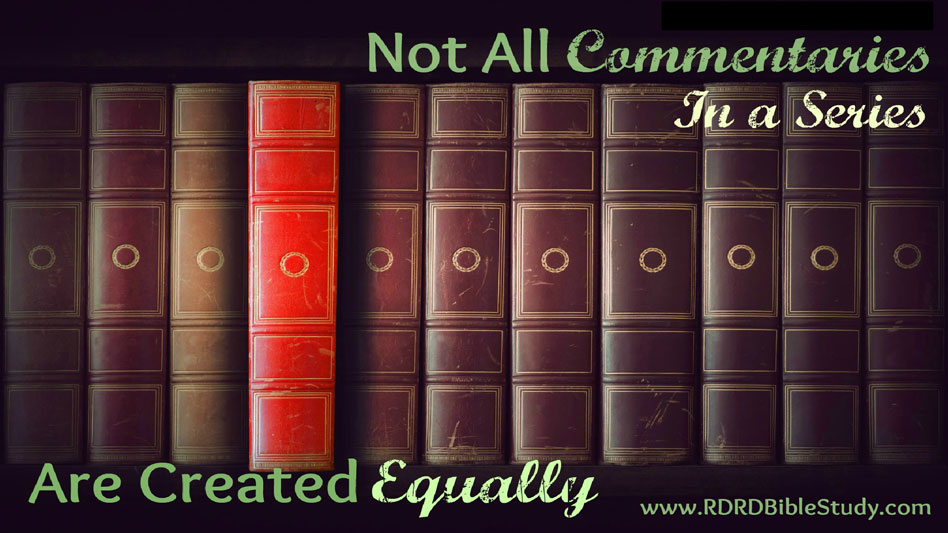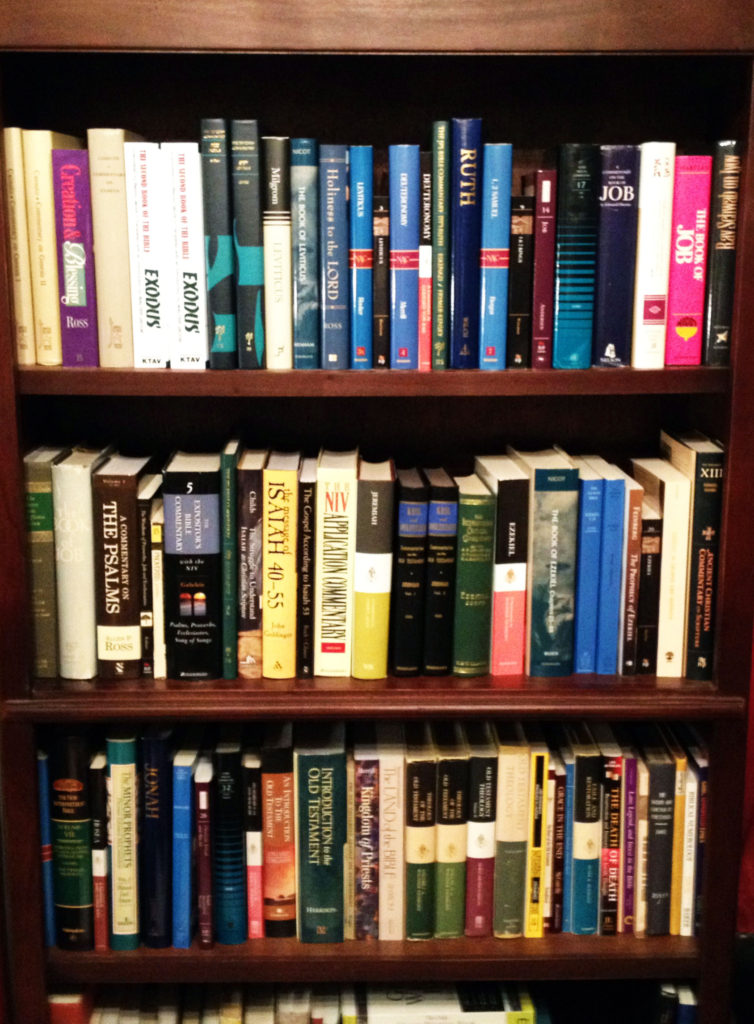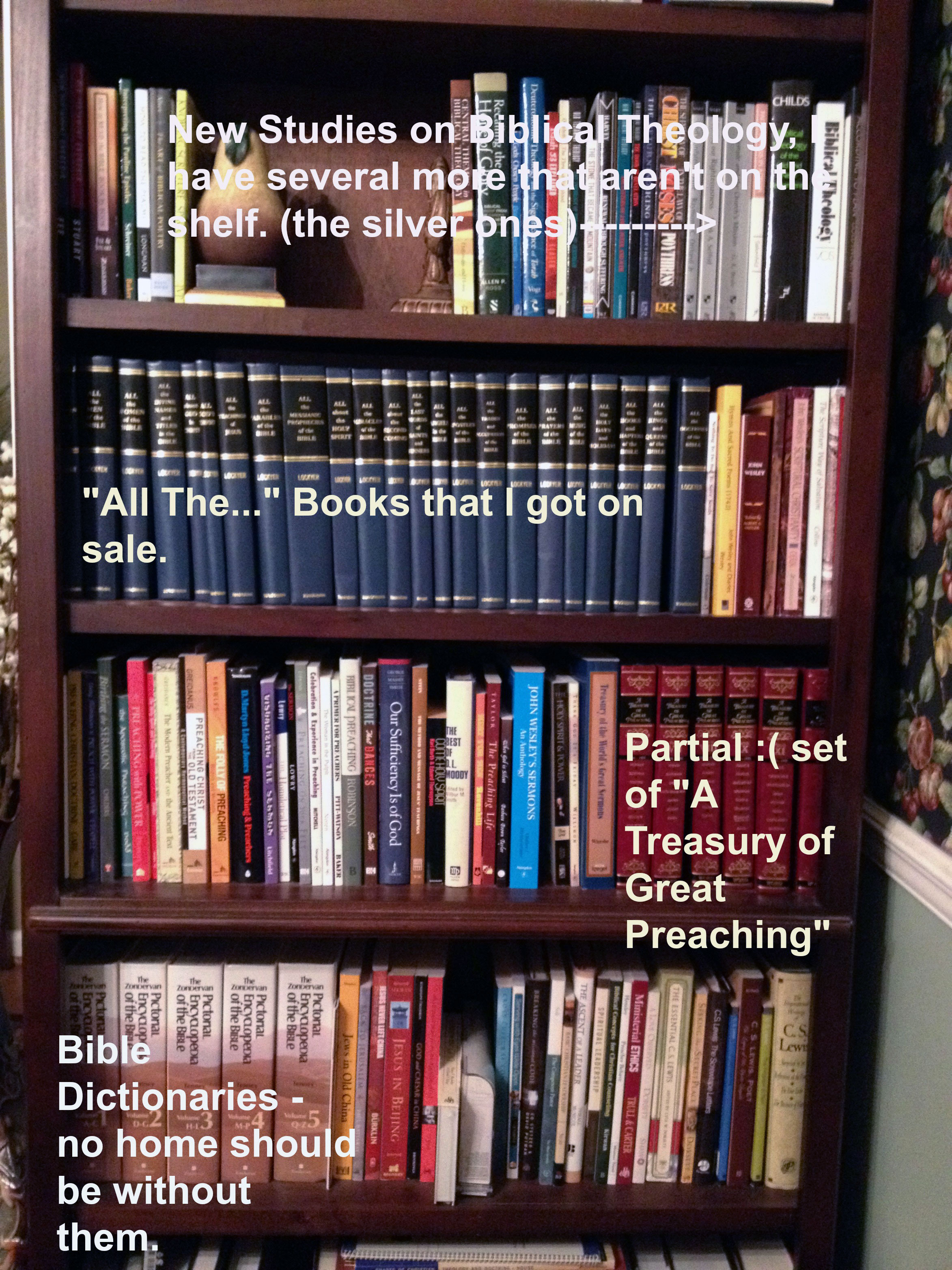Did you own a set of The Hardy Boys, Nancy Drew, Little House on the Prairie, or some other set of books when you were younger?
Or maybe today you own a series of Nora Roberts, Philip Yancey, or J. K. Rowling books?
Whatever series it is, something magical emanates from a row of matching books on a bookshelf.
Predisposition to Matching Books
Being predisposed to the enchantment of matching books early in life, which is then reinforced in the progression of all school library levels, it is entirely understandable that we somehow seek to repeat these warm fuzzies in adulthood. And this can be a potential problem for a “gung-ho” bible student. Because off we (and our money) go to purchase a matching set(s) of commentaries for the study of the Bible.
We get the collection home. Deploy them to their posts. Call them to attention. And like a drill sergeant we pace back and forth admiring the uniform beauty of this bound regiment standing upright and in line—on our bookshelf.
Here’s a random picture from a library. How many different “matching” sets do you see? Leave me a comment…
Magical.
Enchanting.
Impulsive?
(Impulsive?? Yes, somewhat similar to chapstick and emery boards in the Wal-Mart checkout line.)
Wanting, owning, or buying a matching set of commentaries in and of itself is not a bad thing. But is it wise? Moreover, is it practical?
Let Me Be Totally Up Front With You
- No, it is not wise.
- No, it is not practical.
- So, wait!
- Save your money.
- Don’t click the Amazon checkout button yet.
Because the God’s honest truth is…
Not all commentaries in a series are created equally.
Commentaries typically come in a series. And the urge to purchase a whole set of a certain series must be resisted. Humans love matching and consistency. But it is time to say good-bye to the enchantment of having a set of matching books—in Biblical commentaries, at least.
I found this out the hard way by spending hard earned money on books that ended up as little more than dust gatherers. (Sorta ironic since we are made of dust.)
“Gung-Ho” Days of Bible Study
Early in my “gung-ho” (aka “green”) Bible study days, way before I attended seminary or even knew such a thing existed, I went to a local Christian bookstore to browse. Somehow I ended up in the commentary section.
I randomly picked up a commentary on Philippians and started flipping through it. And I thought “Wow! This book has some great stuff!”
So I bought it—a Philippians commentary from the InterVarsity Press NT (IVPNT) Commentary series, written by Gordon Fee. At the time, I had never heard of Gordon Fee. Turns out, he is a renowned Bible scholar and a prolific and engaging writer. It is impossible to get very far in studying anything NT without coming across a book, article, commentary, preface, etc. written by Gordon Fee.
At the time, I hadn’t realized that God had placed in my heart a burning desire to know His Word. So Fee’s words touched me in a way that whetted this unknown appetite. Not knowing much, I attributed it to the commentary, i.e. the book series, as opposed to the author–his giftedness in writing and his devotion to precision in the interpretation of God’s Word.
The IVPNT series is not technical as far as original languages go, nor is it in-depth. But if a commentary is written well, the standard scholarly “in-depthness” of it has less significance.
I learned a great deal from Fee’s insights. And I enjoyed reading the commentary at the same time. Something I can also say for his classic volume on 1 Corinthians, considered by most to be the “go-to commentary” for 1 Corinthians.
The Matching Books Syndrome
Now back to the “gung-ho” days. I enjoyed this IVPNT commentary on Philippians written by Gordon Fee so much—yeah, you guessed it—I ordered several other volumes from the same series. Remember, the matching books syndrome? the repeat of childhood warm fuzzies?When I began reading one of the new additions (I am not exagerrating) it was such a letdown. I thought “What is going on here? Did I order the wrong book?”
Gordon Fee’s book on Philippians had been so insightful, so engaging, I thought all the other books in the series would be equally as good.
The Individual On the Inside of the Flaps
At that point, it became obvious that not all commentaries in a series are created equal. Yes, they have the same shape and size, the same series editors, the same publisher, the same dust jacket. Like a squadron of soldiers, they all look the same from the outside. But there is one thing they do not have in common—the individual on the inside of the flaps. The author.
There is a simple reason why the Hardy Boys, Nancy Drew, and the Little House on the Prairie book series never disappointed. Franklin W. Dixon personas wrote all the Hardy Boys books, Carolyn Keene personas wrote all the Nancy Drew books, and Laura Ingalls Wilder herself wrote all the Little House on the Prairie books.
Same way with the series you may love today—Nora Roberts, Philip Yancey, and J. K. Rowling write all of their books.
The individual on the inside of the flaps equals the individual author’s personality and passion on the inside of the flaps.
But rarely does the same author write an entire Biblical commentary series.
And the author is hands-down the defining factor in whether or not a commentary is average or exceptional.
Varieties of Gifts But The Same Spirit
All the men and women chosen to write commentaries are more than capable biblical scholars, else they would never be asked to do such a task. But, not all do an equal job of passing this information to the reader.
- Authors can be engaging or dry.
- Authors can present a well-rounded commentary or one focused on something that is a particular area of personal interest.
- Authors can mitigate the tedium of controversial passages, or they can present an overkill with every odd interpretation ever devised—even to the extent of spending more time on the controversies held by the minority over those agreed to by the majority.
- Authors holding a minority view of controversial parts of Scripture can spend too much time defending his/her view but not anywhere near the same amount of time defending the views of others.
The list could go on but these are the major differences I encounter on a regular basis.
Can You Know If Commentaries Are Above Average Or Exceptional?
Here’s a picture of some of my OT commentaries. Proof that I do not have a full set of any commentary series.
Now at this point, you may feel overwhelmed because
a) there are a lot of commentaries out there, and
b) how do you know which ones are “exceptional” or at least “above average”?
Thankfully there are books and lists in books that recommend commentaries.
Rarely will you find an entire series recommended. In fact, it is more probable that you will never find an entire series recommended.
Products, such as bible software, offering the inclusion of entire commentary series will attempt to make you think you are getting the best deal since sliced bread. But rarely is it worth the extra money you will be charged to get access to these books. Books you may never use or never need to use.
How Can You Find the Best Commentaries in the Sea of Commentary Series?
Though this seems a subjective question, and it is to a degree, the information can be found. And you can have confidence in its reliability and in your ability to find it.
1) Here is a link to help you find books that survey commentaries or provide lists of recommended commentaries in their appendices.
2) Lots of great reference books, including commentaries, can be found in the bibliographies of various related books, articles, other commentaries, bible and theological dictionaries, etc.
3) Ask your pastor if he/she has a favorite commentary recommendation for the book you are studying, i.e. if you are preparing a class on 1 John, ask about 1 John commentaries.
4) Several of my seminary professors provided commentary lists. You could e-mail an OT or NT professor and ask if he/she has such a list and if they would mind sending it to you. Most seminary professors (and especially ones with lists like this) are pastoral in nature. Their life’s calling is to help people learn how to study the Bible and pass it on to others.
5) One of the best ways (in my opinion and experience) is that the more you read in a certain subject area, the more you will see the same book(s) and/or author(s) cited or referenced. For instance, while studying OT Prophets, I repeatedly ran across book quotes from Ronald E. Clements, an outstanding OT scholar. Indeed, he has several books on OT Prophets which proved to be most helpful. When you repeatedly see a name or book, take this as an indication that this particular person or book is a good resource. There is no exact science to finding commentaries this way, but trust me, the more you read the more you will notice these type of references.
Stay tuned to Rightly Dividing Rightly Dividing for an upcoming post about how to find the context of commentaries. As is always the case, A text without a context is a pretext to a proof text rings so true for Scripture. And it also rings extremely true for commentaries. This will also help in your own commentary selection process.
Until Next time –
The grace of the Lord Jesus Christ and the love of God and the fellowship of the Holy Spirit be with you all. 2 Corinthians. 13:14
p.s. In an effort to be totally transparent, I admit having some matching books. (Who can blame me? Warm fuzzies…)
Okay, yes, I have some matching books. These aren’t commentaries as you can tell by the notations. Biblical Theology is my favorite area of biblical study and I absolutely love to read sermons.












